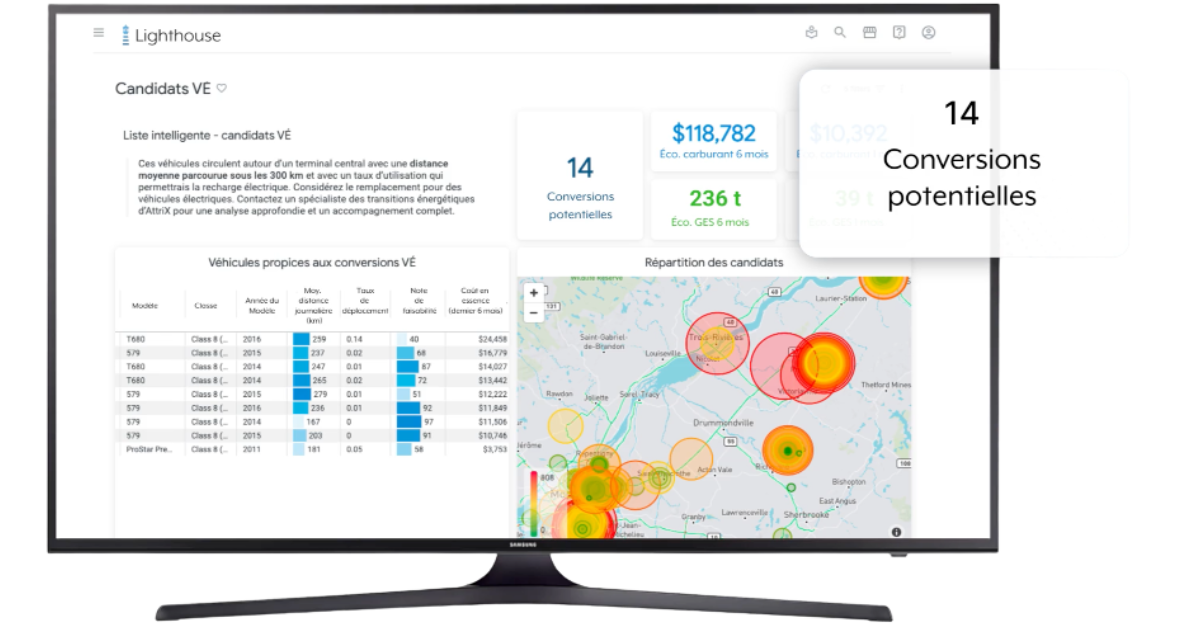Commercial Fleet Management: Strategies, Tools & Tips
Commercial fleet management plays a vital role in keeping businesses running smoothly, especially in industries like transportation, logistics, and...
Keep an eye on the road
Simplify your driver's routine
For efficient decision making
Ensure the compliance of your fleet
Simplify the daily life of your drivers
Maximize the value of your data
Unparalleled monitoring of your assets
The friendly competition that pays off
Planning powered by data
Exceed your customers' expectations
Provide better service to your users
Maximize the satisfaction of your citizens
Simplify your daily life on the construction site
Facilitate the electrification of your fleet
Our experts meet your needs
Easily meet the standards
Improve the safety of your drivers
Protect your data and your fleet
3 min read
AttriX
Dec 20, 2023 10:33:30 AM

Advanced fleet business intelligence is a must-have for any business looking to revolutionize their fleet management. With platforms like AttriX's Lighthouse, you can unlock unparalleled insights and cutting-edge tools to elevate your operational efficiency and strategic decision-making.
Fleet management data is a complete game-changer! With advanced business intelligence tools, data from various sources, such as vehicle performance metrics and driver behaviour analytics, can be collected and analyzed to understand fleet operations comprehensively. This thorough data analysis helps identify areas requiring improvement and optimizes fleet performance. For instance, studying fuel usage patterns can lead to cost-effective route planning and superior driver training programs, resulting in significant cost savings.
Business intelligence platforms such as AttriX's Lighthouse provide rich data that empowers fleet managers to understand their operations granularly. This expert understanding helps in proactive management, allowing for the early identification and resolution of potential issues, thereby ensuring operational continuity and reducing unexpected costs.
Business intelligence has a profound impact on decision-making in fleet management. Fleet managers with access to real-time data can quickly make informed decisions, optimizing operational efficiency. In the dynamic landscape of fleet management, this immediacy in decision-making is crucial, enabling fleet managers to adapt swiftly to changing circumstances and preempt potential problems.
Advanced business intelligence tools offer predictive capabilities that empower fleet managers to anticipate future trends and challenges. This foresight allows for developing strategic plans and policies, ensuring fleet operations' long-term sustainability and efficiency. By leveraging predictive analytics, fleet managers can schedule preventive maintenance, allocate resources efficiently, and create contingency strategies, thus enhancing the overall resilience of fleet operations.
Business Intelligence is an essential aspect of reducing costs in fleet management. These tools are instrumental in identifying inefficiencies in fuel consumption, maintenance, and route management, enabling cost-effective strategies. By optimizing resources, operational costs can be significantly reduced, and environmental sustainability can be achieved by minimizing carbon footprints.
The strategic use of business intelligence tools can lead to better asset utilization and workforce management. Fleet managers can monitor vehicle performance and driver productivity to optimize the deployment of both vehicles and personnel, resulting in enhanced productivity and reduced operational costs. Leveraging business intelligence tools is crucial for efficient and cost-effective fleet management.
In fleet management, there's no room for a one-size-fits-all approach. Business intelligence systems provide customizable metrics and key performance indicators (KPIs) that ensure the analysis aligns with specific business objectives. This customization allows for targeted insights, making the data analysis more relevant and actionable.
Moreover, this flexibility in setting metrics and KPIs enables businesses to adapt their analytical focus as their goals and challenges evolve. Whether it's about improving fuel efficiency, reducing maintenance costs, or enhancing driver safety, business intelligence tools can be calibrated to monitor and report on these critical areas, facilitating continuous improvement in fleet operations. So, investing in a business intelligence system is a no-brainer for any business that wants to stay ahead of the curve and achieve its fleet management goals.
Incorporating business intelligence into fleet management does not require a complete system overhaul. With advanced tools like AttriX's Lighthouse, businesses can seamlessly integrate data analysis into their current workflows. Consolidating data from various sources provides a comprehensive view of fleet operations without disrupting existing systems.
Integrating with existing systems allows businesses to leverage their current technological investments while enhancing their capabilities with advanced business intelligence tools. This integration makes it easier to transition to data-driven management, reducing downtime and ensuring business continuity.
Integrating business intelligence tools into fleet management is essential for modern businesses. With AttriX's Lighthouse, businesses can effortlessly consolidate data, analyze it, and make informed decisions without disrupting their current workflows.
Enhancing safety and compliance is a significant advantage of business intelligence in fleet management. By continuously monitoring driver behaviour and vehicle performance, these tools enable proactive management of safety concerns, reducing accident rates and ensuring adherence to industry regulations.
In addition to enhancing driver safety, business intelligence tools also assist in regulatory compliance. With stringent regulations governing the fleet industry, these tools provide:
In the fast-paced and constantly evolving transportation industry, fleets with business intelligence tools are better positioned to tackle the future confidently. These systems offer unmatched flexibility and foresight to adapt to dynamic market conditions, regulatory changes, and technological advancements, thereby maintaining a definitive edge over their competition.
As environmental concerns and sustainability continue to take center stage, business intelligence tools will play a critical role in helping fleets shift toward greener practices. By providing accurate and up-to-date data on fuel consumption, emission levels, and alternative fuel usage, these tools enable fleets to make informed decisions and stay ahead of the curve in meeting environmental goals and regulatory requirements.
In today's competitive landscape, integrating advanced fleet business intelligence tools like AttriX's Lighthouse is essential for modern fleet management. This strategic implementation empowers businesses with in-depth insights, driving efficiency, cost reduction, and informed decision-making. In an industry where staying ahead is crucial, leveraging business intelligence is not just a technological upgrade—it's a strategic imperative for success. Failure to incorporate such tools puts businesses at a significant disadvantage, hindering their ability to compete and succeed in the long run.

Commercial fleet management plays a vital role in keeping businesses running smoothly, especially in industries like transportation, logistics, and...

In fleet management, fleet compliance services play a much bigger role than just checking a box. They’re about keeping your drivers safe, your...

Trucking has always come with its fair share of challenges, from road safety and liability issues to managing fleet efficiency. As the industry...